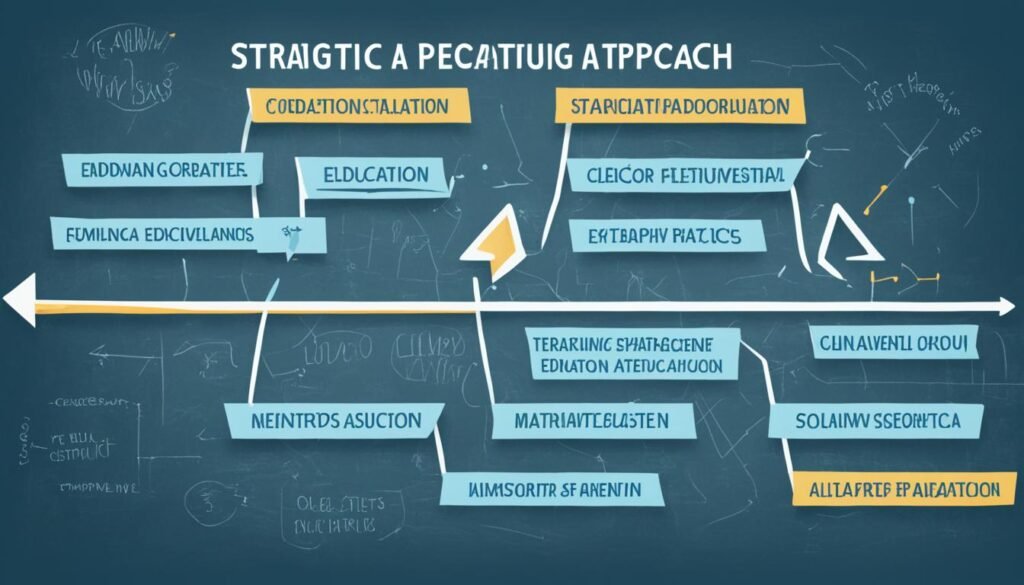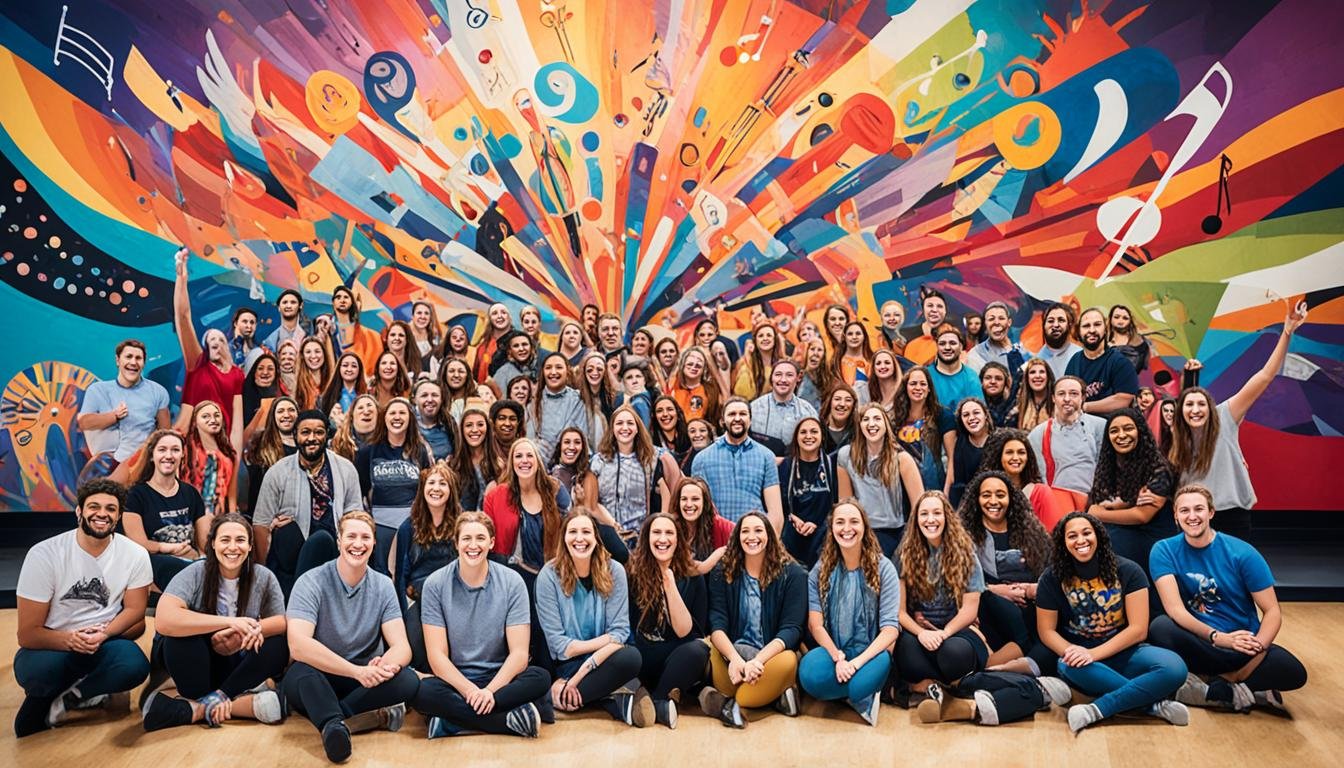Climbing the career ladder is a goal many professionals strive for, and education plays a crucial role in achieving career advancement. Through education, individuals gain the knowledge, skills, and credentials needed to propel their careers forward. This article will explore the transformative power of education and how it can help individuals climb the career ladder. From lifelong learning to mentorship and advanced education opportunities, we will delve into various strategies and approaches that can lead to professional growth and success.
Key Takeaways:
- The transformative power of education can propel individuals forward in their careers.
- Lifelong learning is essential for adapting to a shifting business landscape and achieving career growth.
- Mentorship and constructive feedback can play a vital role in career enhancement.
- Investing in advanced education opportunities and upskilling can lead to upward mobility.
- Strategic approaches to professional growth through education maximize career potential.
The Vital Link Between Lifelong Learning and Career Growth
Lifelong learning is the foundation for career growth and advancement. In an ever-evolving business landscape, professionals must adapt and acquire new skills to stay relevant. Continuous education and ongoing professional development play a critical role in enhancing skills, expanding knowledge, and opening doors to new opportunities.
Adapting to a Shifting Business Landscape
The business landscape is constantly evolving due to technological advancements, market changes, and industry trends. Professionals who can adapt to these shifts have a competitive advantage and increased career opportunities. Adapting to a shifting business landscape requires career agility and the willingness to embrace change. By staying informed about industry developments and proactively upskilling, professionals can position themselves for growth and success.
Investing in Ongoing Professional Development
Investing in ongoing professional development is essential for career growth. Continuous education allows professionals to acquire new skills, expand their knowledge base, and stay competitive in the job market. Attending workshops, webinars, conferences, enrolling in online courses, and seeking certifications are some of the ways professionals can invest in their growth. By continually learning and developing new skills, individuals can enhance their career prospects and pursue new opportunities.
Engaging with Continuous Education for Professional Success
Engaging with continuous education is a key component of professional success. Lifelong learning is a mindset that involves staying curious, seeking out new learning opportunities, and continually expanding one’s skill set. By embracing continuous education, professionals can stay ahead of industry trends, acquire in-demand skills, and adapt to the changing demands of their profession. Continuous education is a pathway to career advancement and personal growth, empowering individuals to achieve their professional goals.
The Role of Mentorship in Achieving Career Milestones
Mentorship plays a crucial role in helping individuals achieve career milestones and drive professional growth. The guidance, wisdom, and insights that mentors provide based on their own experiences can be invaluable in navigating the challenges and complexities of a career journey. By leveraging their experience, expanding networks through mentor connections, and utilizing constructive feedback, professionals can enhance their career opportunities and reach new heights of success.
Leveraging Experience for Professional Growth
One of the key benefits of mentorship is the opportunity to leverage past experiences for professional growth. By reflecting on and learning from previous roles or projects, professionals can gain valuable insights and apply them to current and future challenges. Whether it’s identifying strategies for success or navigating obstacles, leveraging experience enables individuals to build upon their strengths and address areas for improvement, ultimately driving their career growth and advancement.
Expanding Your Network through Mentor Connections
Expanding one’s professional network is essential for career advancement, and mentor connections play a vital role in this process. Mentors can introduce mentees to industry leaders and provide valuable connections that can lead to career opportunities. Building relationships with mentors who are well-established in their fields can open doors and expose mentees to new perspectives and invaluable knowledge. By embracing mentor connections, professionals can expand their networks and enhance their chances of career success.
Utilizing Constructive Feedback for Career Enhancement
Constructive feedback is a powerful tool for career enhancement and professional development. Seeking feedback from mentors, supervisors, and colleagues enables professionals to gain valuable insights into their performance, identify areas of improvement, and refine their skills. By embracing feedback and actively working on areas of development, professionals can accelerate their career progression and position themselves for greater success. Constructive feedback acts as a catalyst for growth, helping individuals to continually improve and enhance their skills and competencies.
By leveraging mentorship, professionals can tap into the wealth of knowledge and experience that mentors offer, gaining valuable insights and guidance to advance their careers. Whether it’s leveraging experience, expanding networks through mentor connections, or utilizing constructive feedback, mentorship plays a transformative role in achieving career milestones and driving professional growth.
Advanced Education Opportunities and Upward Mobility
Advanced education opportunities have a profound impact on upward mobility and career advancement. Professionals who pursue advanced degrees, certifications, or specialized training in specific industries or fields have a distinct advantage in their career journeys. These educational endeavors not only enhance their knowledge and skills but also open doors to new career opportunities.
By earning advanced degrees, professionals can deepen their expertise in their respective fields and position themselves as industry leaders. Advanced education provides a strong foundation for career growth, equipping individuals with the knowledge and critical thinking skills necessary to excel in their roles. Additionally, specialized training programs allow professionals to acquire in-demand skills that are highly valued by employers.

Furthermore, advanced education enables professionals to stay ahead of industry trends and developments. Through rigorous academic programs, professionals can explore cutting-edge research and gain a comprehensive understanding of emerging technologies and practices in their fields. This knowledge equips them with a competitive edge, enabling them to make well-informed decisions and contribute to the progression of their industries.
Success stories from individuals who have leveraged advanced education opportunities serve as inspiration for aspiring professionals. These stories demonstrate the transformative power of advanced education in propelling careers forward and achieving personal and professional fulfillment. By showcasing these examples, we aim to inspire and encourage our readers to consider advanced education as a strategic pathway to reach their career goals.
Skills Development: The Cornerstone of Career Advancement
Skills development is the foundation for career advancement and professional growth. In today’s fast-paced job market, acquiring and honing in-demand skills is essential for staying competitive and achieving career progression. This section will explore the importance of skills development and provide guidance on how professionals can identify, acquire, and develop the skills necessary to propel their careers forward.
Identifying In-Demand Skills for Advancement
To advance in your career, it is crucial to identify the in-demand skills that are highly sought after by employers in your industry. Staying up to date with industry trends and market demands will help you determine the skills that can set you apart from your peers. By conducting thorough research and staying informed, you can gain insights into the skills that are currently in high demand.
Once you have identified the in-demand skills, create a skills development plan that outlines how you can acquire and develop these skills. This could involve taking courses, attending workshops, participating in industry conferences, or seeking specialized training.
“The future belongs to those who learn more skills and combine them in creative ways.” – Robert Greene
Fostering Career Progression through Specialized Training
Specialized training is a key strategy for fostering career progression. By pursuing training programs or certifications that are specifically tailored to your profession or industry, you can acquire the specialized skills and knowledge needed to excel in your career.
Specialized training not only enhances your skills but also broadens your professional network, opening doors to new career opportunities. By connecting with experts and like-minded professionals in your field, you can gain valuable insights, mentorship, and potential job referrals.
Investing in specialized training shows dedication and commitment to your professional development, making you a more desirable candidate for career advancement opportunities. Employers often value candidates who demonstrate a willingness to continuously improve and stay current with the latest industry trends.
By prioritizing skills development and investing in specialized training, you can position yourself for career advancement and professional growth. The acquisition of in-demand skills will not only enhance your job prospects but also equip you with the expertise required to thrive in today’s competitive job market.
To create a successful career development plan, it is vital to regularly assess your skills and identify areas for improvement. By staying proactive and adaptable, you can acquire the skills necessary to meet the evolving demands of your profession and seize new career opportunities. By continuously developing your skills, you will be well-prepared to navigate the ever-changing career landscape and achieve your professional goals.
The Strategic Approach to Professional Growth Through Education
Taking a strategic approach to professional growth through education is essential for career advancement. In order to achieve long-term success and reach our career goals, we must align our educational pursuits with our desired career path. By doing so, we can ensure that the knowledge and skills we acquire will directly contribute to our professional growth.
Identifying the right educational programs, courses, or certifications is a crucial step in this strategic approach. We need to carefully evaluate the relevance and applicability of each educational opportunity to our career goals. By conducting thorough research and seeking guidance from industry professionals, we can make informed decisions that will set us on the path to success.
Creating a personalized educational plan is another key aspect of our strategic approach. This plan should take into account our current skill set, desired areas of growth, and the specific knowledge required to excel in our chosen field. By mapping out the courses or certifications we need to pursue, we can ensure that our educational journey aligns with our long-term career objectives.
By adopting a strategic approach to professional growth through education, we are positioning ourselves for maximum success. We are investing our time and resources in a purposeful manner, focusing on acquiring the knowledge and skills that will propel our careers forward. With this strategic mindset, we can confidently navigate the ever-changing landscape of our industries and continuously advance in our chosen career paths.

Education for Career Advancement: Unlocking New Career Paths
Education is a powerful pathway to unlock new career paths and expand professional horizons. By acquiring new knowledge, skills, and qualifications, individuals can explore different career options and transition into new industries or roles. This section will explore the transformative role of education in career advancement and professional development.
One of the key benefits of education for career advancement is the acquisition of transferable skills. By gaining expertise in a particular field or industry, individuals can leverage their knowledge and skills to enter new career paths with confidence. For example, a professional with a background in marketing may choose to pursue additional education in data analytics, opening doors to exciting opportunities in marketing analytics or data-driven marketing strategies.
Real-life examples of individuals who have successfully transitioned their careers through education serve as inspiring success stories. These stories highlight the power of education in enabling individuals to overcome challenges, reinvent themselves, and pursue their passions. Whether it’s a nurse who becomes a healthcare administrator or a teacher who transitions to instructional design, education equips individuals with the necessary skills and knowledge to thrive in new career paths.
Furthermore, education fosters professional development by providing individuals with a broader perspective and deeper understanding of their chosen fields. Through formal education programs, professionals can gain a comprehensive understanding of industry trends, best practices, and emerging technologies. This knowledge allows them to stay ahead of the curve, adapt to changing market dynamics, and seize new opportunities for career growth.
By leveraging education to explore new career paths, professionals can also broaden their networks and connect with individuals in different industries and roles. These connections can open doors to mentorship opportunities, collaborative projects, and career advancements that would not have been possible otherwise. Education serves as a catalyst for expanding professional networks and creating valuable connections that can lead to exciting career prospects.
In conclusion, education plays a vital role in unlocking new career paths and expanding professional horizons. Through the acquisition of knowledge, skills, and qualifications, individuals can explore different career options, transition into new industries or roles, and foster continuous professional development. The power of education in career advancement cannot be overstated, as it equips individuals with the tools and resources needed to navigate the ever-evolving job market and seize new opportunities for growth and success.
Navigating the Career Progression Journey with Advanced Education
Advanced education is essential for professionals looking to navigate the complex journey of career progression. By pursuing advanced education, individuals can gain the necessary skills, knowledge, and credentials to propel their careers forward. In this section, we will explore the importance of setting career goals aligned with educational achievements and provide strategies for balancing work-life commitments while continuing education for career development.
Setting Career Goals Aligned with Educational Achievements
Setting career goals that are aligned with educational achievements is crucial for career progression. When professionals have a clear vision of their desired career outcomes, they can create a roadmap that includes pursuing advanced education to acquire the necessary qualifications. By setting SMART (Specific, Measurable, Attainable, Relevant, Time-bound) goals that reflect their educational achievements, professionals can stay motivated and focused on their career advancement journey. Real-life success stories and practical tips will be shared to inspire readers to set ambitious yet achievable career goals.
Balancing Work-life and Continuing Education for Career Development
One of the challenges professionals face when pursuing advanced education is balancing work-life commitments. It can be daunting to juggle work responsibilities, personal obligations, and educational pursuits simultaneously. However, with the right strategies and practical tips, it is possible to achieve work-life balance while continuing education for career development. This subsection will explore time management techniques, alternative learning formats, and the benefits of integrating education into one’s daily routine. By sharing real-life examples and success stories, we aim to empower readers to prioritize their career development without sacrificing their personal lives.
| Benefits of Setting Career Goals Aligned with Educational Achievements | Strategies for Balancing Work-life and Continuing Education |
|---|---|
|
|
By adopting a strategic approach to career progression through advanced education, professionals can navigate the complexities of the journey and achieve their goals. Setting career goals aligned with educational achievements and balancing work-life commitments are crucial steps toward advancing one’s career. With the right mindset, determination, and support, professionals can unlock their full potential and thrive in their chosen fields.

The Impact of Upskilling and Reskilling on Career Trajectories
Upskilling and reskilling play a significant role in shaping career trajectories. Acquiring new skills and knowledge can have a profound impact on career advancement and professional growth. By embracing career-focused educational programs, individuals have the opportunity to enhance their skill acquisition and position themselves for greater career opportunities.
Embracing the Challenge of Career-Focused Educational Programs
Career-focused educational programs offer immense potential for professional development. While pursuing these programs may present challenges, they provide individuals with the opportunity to acquire specialized skills and knowledge directly relevant to their desired career trajectories. By embracing the challenges of career-focused educational programs, individuals can transform these obstacles into stepping stones for growth and advancement.
It is important to view these challenges as opportunities for personal and professional development. By immersing oneself in a demanding educational program, individuals can develop resilience, problem-solving abilities, and adaptability – key qualities that are highly valued in modern professional environments.
“The future belongs to those who are willing to embrace continuous learning and who can adapt to the rapidly evolving nature of work.” – John Smith, CEO of XYZ Company
Real-life success stories serve as inspiration for individuals considering career-focused educational programs. These stories demonstrate how individuals have leveraged the challenges and learning experiences provided by these programs to accelerate their career growth and achieve their professional aspirations. By sharing such stories and offering practical tips, individuals can gain a deeper understanding of the potential benefits and rewards that await them on their educational journey.
Career Advancement Training for the Modern Professional
Career advancement training is crucial for the modern professional seeking growth and success. These specialized training programs or courses focus on providing professionals with the skills, knowledge, and strategies necessary to thrive in today’s competitive job market.
By enrolling in career advancement training, professionals can gain insights into industry trends, acquire cutting-edge skills, and develop a competitive edge in their respective fields. This training equips individuals with a holistic understanding of their industries and helps them stay ahead in an ever-changing professional landscape.
Real-life examples of professionals who have benefited from career advancement training serve as a testament to the value and impact of such programs. Regardless of industry or career stage, career advancement training can provide individuals with the tools they need to reach their full potential and achieve their career goals.

From embracing the challenges of career-focused educational programs to investing in specialized career advancement training, professionals can unlock new possibilities, enhance their skill set, and accelerate their career trajectories.
In the next section, we will explore strategies to maximize career potential through targeted learning strategies. We will discuss the value of continuing education, networking, mentorship, and staying informed about industry trends.
Maximizing Career Potential Through Targeted Learning Strategies
Maximizing career potential requires the implementation of targeted learning strategies. In today’s competitive job market, continuous education is key to staying ahead and achieving professional success. By leveraging targeted learning strategies, individuals can enhance their skills, expand their knowledge base, and unlock new career opportunities.
Continuing education plays a vital role in maximizing career potential. By actively seeking out and engaging in relevant courses, workshops, and training programs, professionals can acquire new knowledge and stay updated on industry trends. This ongoing commitment to learning demonstrates a proactive approach to professional growth and makes individuals more marketable in their respective fields.
Networking is another crucial component of targeted learning strategies. Building meaningful connections with industry professionals, mentors, and colleagues can provide valuable insights, guidance, and career opportunities. By attending industry events, joining professional associations, and participating in online communities, individuals can expand their networks and tap into the collective knowledge and expertise of others.
Mentorship is a powerful tool for maximizing career potential. A mentor can offer guidance, share their experiences, and provide valuable advice that can contribute to professional growth. By seeking out mentorship opportunities, individuals can gain valuable insights into their chosen field, develop critical skills, and gain a fresh perspective on their career paths.
Staying informed about industry trends and advancements is essential for maximizing career potential. By regularly reading industry publications, participating in webinars, and staying connected with professional networks, individuals can stay ahead of the curve and identify emerging opportunities. This knowledge can be applied to career decisions, skill development, and strategic planning, ensuring individuals remain competitive in the ever-evolving job market.
By implementing targeted learning strategies such as continuous education, networking, mentorship, and staying informed, individuals can maximize their career potential and achieve professional success. These strategies empower individuals to take control of their career paths, actively pursue growth opportunities, and adapt to the changing demands of the professional landscape. With a proactive and strategic approach to learning, individuals can unlock their full potential and thrive in their chosen careers.
Conclusion
Throughout this article, we have explored the transformative power of education in climbing the career ladder. We have seen how education equips individuals with the knowledge, skills, and credentials necessary for career advancement. From lifelong learning to mentorship and advanced education opportunities, we have uncovered various strategies and approaches that can lead to professional growth and success.
By emphasizing the synergy between education and career ladder climbing, we have highlighted the vital link between lifelong learning and career growth. We discussed the importance of adapting to a shifting business landscape, investing in ongoing professional development, and engaging with continuous education for professional success.
Mentorship has also played a crucial role in our exploration, as we discussed the benefits of leveraging experience, expanding networks through mentor connections, and utilizing constructive feedback for career enhancement. We have seen how advanced education opportunities and upskilling can unlock new career paths, while skills development remains the cornerstone of career advancement.
Lastly, we emphasized the importance of taking a strategic approach to professional growth through education. By aligning educational pursuits with career goals, individuals can unlock their full potential and envision future success through continuous learning and personal development.
As we conclude, we encourage you to embrace the power of education and lifelong learning in your own career advancement journey. Envision your future success and take proactive steps to acquire new knowledge, develop valuable skills, and create meaningful connections. By investing in your own growth and development, you can seize opportunities, overcome challenges, and reach new heights in your career.








